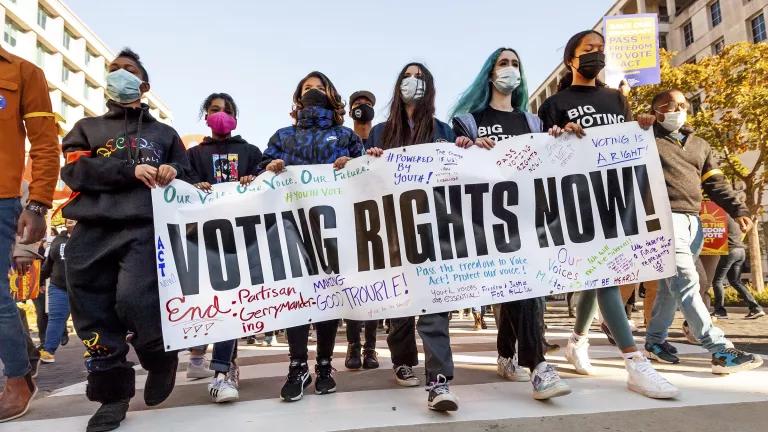Understanding Trump’s Harmful Attack on NEPA
The National Environmental Policy Act gives us all a voice. The Trump administration is trying to silence it.

The Cross-Bronx Expressway, looking east at Webster Avenue, under construction in New York City in 1960.
The National Environmental Policy Act gives us all a voice. The Trump administration is trying to silence it.
While America faces the twin crises of a viral pandemic and a reckoning with its history of racism and inequity, President Donald Trump is pushing ahead with a regulatory assault that would exacerbate both of these extraordinary challenges.
The White House today issued a rule that would gut the National Environmental Policy Act (NEPA), a law that has provided the foundation for environmental protection and public participation in government actions for half a century. Curtailing NEPA makes no sense in normal times; now, it’s devastating, especially for communities of color who are often targeted by dirty or dumb projects.
NEPA sets out a simple yet profound standard: Before the government can take any major action, it needs to assess the impact of the project, inform the public of its plans, consider other options, and open up its proposal to public comment.
This simple framework requires the government to consider alternatives before bulldozing a neighborhood for a new highway, allowing oil drilling on public land, or approving a pipeline through a national forest. And it opens up decisions to all of us so that industry cannot get its way behind closed doors.
The new rule from the administration would either eliminate or curtail these reviews in a number of ways. It includes two broad-reaching changes that could eviscerate the very essence of the law:
First, under Trump’s plan, a large swath of government-approved and funded projects would be exempt from NEPA reviews altogether.
NEPA applies to “major federal actions.” Courts have interpreted this phrase broadly. Trump’s rules change the definition to exclude those actions where “minimal federal funding or minimal federal involvement” limits the agency’s control over “the outcome on the project.” Agencies get to decide what counts as “minimal” on their own.
Consider an example like the Dakota Access Pipeline, the 1,172 mile oil pipeline running from North Dakota to Illinois. The Army Corps of Engineers had to grant approval for certain water crossings. This required the agency to complete environmental analysis of its decision before making it. Under the new rules, the Corps could’ve decided that its role would not affect the outcome of the project and the public might not even know that the Corps had approved it. Projects this big and polluting need to be open to public comment and challenge—and courts have stated that time and time again.

A liquid natural gas pipeline runs through the yards of homes in Exton, Pennsylvania.
Second, the rule changes the definition of “effects” that must be considered to eliminate “cumulative” and “indirect.”
We all can understand that one road or one oil well may have a limited impact, but many roads cutting through a pristine forest or dozens of wells dug over a sensitive aquifer could lead to severe devastation. NEPA promises that decisions must make sense for tomorrow as well as today, and the courts have established that this means considering the cumulative or indirect impacts of a project.
Consider what exempting indirect impacts would mean: A developer of a pipeline to supply an export facility for liquefied natural gas would need to consider the greenhouse gas emissions from clearing the land and building the pipeline—but wouldn’t need to consider the impact of burning all that gas.
The lawmakers who conceived NEPA realized that heading off disastrous projects is better (and cheaper) than cleaning up after them. Climate change has made that truer than ever; it’s a lesson the Trump administration wants to ignore.
One irony of the Trump administration’s regulatory attack on NEPA is that while it’s aimed at fast-tracking approvals for pipelines, coal mines, and oil drilling, it’s actually going to lead to more of a legal mess that will slow down all kinds of projects. Trump cannot change what the statute that Congress passed requires. Courts have said over and over again that NEPA’s requirements include analyzing cumulative impacts. Agencies and developers who ignore this will find themselves in court over and over again.
The rush to gut NEPA is based on a faulty set of facts. These major federal projects affect our health, our communities, and our future. In the past, it has been the poor and communities of color whose health have suffered the most from polluting projects. NEPA can change this. NEPA gives us all a voice. Trump is trying to silence it.
Given the crises our nation is facing, we cannot ignore the risk of more pollution nor the voices of the poor and communities of color. We will not let this stand.


